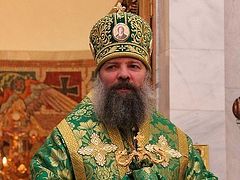 The actor Sergei Bezrukov playing Ieshua Ha-Nozri (Jesus of Nazareth) in the movie, Master and Margarita
The actor Sergei Bezrukov playing Ieshua Ha-Nozri (Jesus of Nazareth) in the movie, Master and Margarita
“There is no little baby Jesus.”
“You are absolutely right,” said Fr. German. “There is no little baby Jesus. It is a figment of your sick imagination.”
Elena Khaenskaya. A Priest and Aliens
Any man may choose eternal death. Those who choose it will have it.
C. S. Lewis. The Great Divorce
Many are familiar with the caustic expression, “rose-tinted Christianity”.1 It belongs to the Russian philosopher Konstantin Leontiev (1831–1891), who branded the contemporary Church fringe liberal intelligentsia with it. In our days, a new form of such “Christianity”, which deserves to be called “syrupy Christianity”, has appeared and is gaining popularity.
Its representatives, who are undoubtedly liberal intellectuals, like those in the time of K. Leontiev, “with Bolshevik fire in their breasts” [an allusion to the German song, “The Little Drummer Boy”, which was translated into Russian as a revolutionary song by the Soviet poet Mikhail Svetlov (1903–1964).—Trans.] stand up for apokatastasis panton2 and reject synergy—that is, voluntary cooperation between man and God as a prerequisite for salvation.
These strange people want a person to live his life without giving God a place even in the pantry, disregarding Him, and yet want God to save him after death despite his choices, each of which left a mark on his soul, making it increasingly less permeable and more hermetically sealed against grace. They want God to impose Himself on a person in spite of his clear, obvious and life-confirmed unwillingness to be with God.
Interestingly, you have merely to disagree with their opinion and they will lash out at you without choosing expressions, constantly labeling you and making ad hominem remarks. The advocates of universal salvation are not good at respect for others or even mere politeness. And it is no coincidence—the roots of “syrupy Christianity” are in irresponsibility, in the quality of an infantile, immature personality. Infantile people, like spoiled children, find it difficult to tolerate disagreement, or any refusal to admire them and say yes to them. They are unfamiliar with the concept of intellectual honesty and find it difficult to gain respect (respecting a specific opponent is harder than melting from abstract “love” for everyone at once).
Another underlying reason for this phenomenon is “naivety regarding the experience of evil”.3 And here we can be happy for the partisans of “syrupy Christianity”. Obviously, life has turned its elegant side to them so far; they have not met people face to face who deliberately indulge in evil, and so they have no idea what they themselves are chirping about.
Well, I wouldn’t want anyone to meet the tormentor after death and spend eternity with him. I would look into the eyes of these apologists for apokatastasis and ask them: Are you ready to exchange kisses (in eternity) with the pedophile who molested your child? Or with the teenagers who just for fun beat your beloved husband to death as he was returning from work? Is anyone saying “yes”? I will believe you, provided you have gone through a concentration camp. If you haven’t, I won’t believe you. Such statements from a person who has no experience of evil are not mercy, but starry-eyed idealism, which will be shattered into smithereens after a head-on collision with life.
In the former USSR, “syrupy Christianity” flourished because of the writer Mikhail Bulgakov (1891–1940), who in his novel, Master and Margarita, created the wretched and caricatured image of an absurd wandering philosopher named Ieshua, whom the ignorant Soviet intelligentsia happily took for Christ. Many years have passed since then, but the image of the “sweet baby Jesus”, for whom “there are no bad people”, inspired by the novel, continues to confuse immature minds.
This is how St. Paisios the Hagiorite characterizes this phenomenon:
“We want to sin and want to have a good God Who should forgive us, while we sin. That is, we will do whatever we please, and He must forgive us. He always forgives us, while we do our own things.”4
Humanly speaking, this is an understandable desire, since none of us in our right mind can be sure of what awaits us in the afterlife. But what makes us human beings is freedom—the ability to make any choice, even a wrong or fatal one; the ability to persevere in this choice, rejecting God and His love; and even the ability to say to God: “I hate You and won’t accept anything from You.” Alas, history knows such examples.
The Lord calls us to salvation, but He does not save us by force—because a person’s choice, the direction of his life and his will are important.
St. Silouan the Athonite, to whom apologists for apokatastasis like to refer for some reason, said:
“Our own will is like a wall of brass between us and God, preventing us from coming near to Him or contemplating His mercy.”5
“The doctrine of apokatastasis is actually incompatible with the Christian teaching of the free will of rational beings, according to which the direction of free will can only be changed from within. Such change cannot be imposed on free will from outside, even by the power of Divine omnipotence. Love cannot be imposed by force. Therefore, God cannot save man without his consent.”6
In order to enable God to restore a personality that has been corrupted and destroyed by sin and breathes anger against others, a person must turn to Him, open up to Him. That person should say: “Forgive me, heal me, transform me.” In order to repent and be saved, a person must have something in him capable of resonating with God’s love—otherwise this love will burn him up.7
The question of the balance of justice and mercy is one of the most difficult in Christian doctrine. All our virtues are inherent in us because they are originally the properties of God (man is the image of God, a living icon of the Creator). Of course, this applies to justice as well. God’s justice is different from ours, since our knowledge of another person is always partial and relative; we don’t see if he repents deep in his heart, and, most importantly, our righteous anger so often insensibly turns into spite. In the all-perfect God, all virtues are fused together and justice is the reverse side of mercy. In us they often contradict each other, but it doesn’t mean that to be always merciful is good and to be just is bad. That is impossible, and the holy Prince Vladimir had to be convinced of this—because he at first wanted to have mercy on criminals, unwittingly being unfair to their victims. We don’t know how exactly this contradiction is resolved in the Kingdom of Heaven, but as consistent Christians we are obliged to believe the Savior, Who repeatedly spoke those fearful words about “weeping and gnashing of teeth.”
Or, for instance, what about this citation from the Gospel?
Then shall He say also unto them on the left hand, Depart from Me, ye cursed, into everlasting fire, prepared for the devil and his angels (Mt. 25:41).
So far, not a single advocate of universalism has explained to me how these words of Christ should be understood. As a lie? But this is blasphemy. As intimidation? But Christ doesn’t use such techniques of persuasion.
“Glory be to the Lord, for He gave us repentance. Through repentance we shall all, every one of us, be saved. Only those who refuse to repent will not find salvation; and therein I see their despair, and shed abundant tears of pity for them.”8
“Those who depart from Him of their own free will are separated from Him by Him—a fate which they themselves have chosen.”9
Our Lord will not violate man’s freedom, his moral choice. The humility of God, kenosis, reaches a point where He puts inhibitions on His own omnipotence—and this is the most precious thing in His relationship with man.
By opening a cage we take into account that the bird inside it may fly away. Having endowed man with free will, God agrees in advance that this will can lead man to hell.
“The love of God presupposes full respect for His creation.”10
Any paradise into which people are driven by force ceases to be Paradise and becomes a concentration camp. The God Who violates the human free will ceases to be the Christian God. Christianity without kenosis and synergy is not only a heresy, it is also nonsense.





